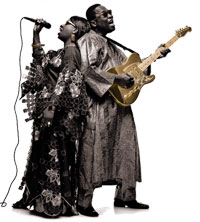Music |
Amadou & Mariam: Welcome to Mali
By
Published: Mar 31, 2009
Category:
World
Amadou Bagayoko and Mariam Doumbia have climbed to the pinnacle of World Music. But "Welcome to Mali" is wrongly titled, for with this release, they’ve made another, dazzling ascent — this isn’t World Music, a specialty release to be filed in the Mali section. It’s music from a very big world, made for everyone in the world. If you buy, download or steal no other music this year, stop right here. This is the one. [To buy the CD from Amazon, click here. For the MP3 download, click here.]
This is the one because it’s the right idea at the right time: a bundle of joy for a hurting planet. It’s so all-inclusive — “an original East Coast-West Coast collaboration”, a rapper friend of theirs shouts at the start of a song — that you’ll have a hard time locating this music by geographic origin. It was recorded in Paris, London, Dakar, and Senegal. It uses traditional African instruments and state-of-the art electronics. And Amadou and Mariam sing in French and English — not that the words much matter.
Consider "Sabali", the first song. As it starts, you might think you’re hearing a scratchy radio broadcast from the 1930s. Then comes the plinking of a ukulele (or is it?). And then Mariam floats in — a birdlike soprano that may not break glass, but certainly clutches your heart and your attention. Entering the room, balancing her, a French horn (or is it?). And now…but what’s this? Dance-hall drumming. Synthesizer runs of electronic notes, up and down the scale.
This is harmonious, joyous, pop music that just happens to be symphonic in its power. Its real genius is its accessibility — it sounds so simple, so organic, that it’s like a song you’ve always hummed (and danced to) in your private happy moments. The lyrics, for what they’re worth, support Amadou and Marian’s vision of a beautiful world: “La vie est belle avec toi….. je te fais un gros bisou”. But even more, they’re just sound. (From the lyric sheet: “La llalallallallallalallaalallaa… sabalabalabala bala bala babla.”) And those sounds evoke Motown and Phil Spector as much as they do African tribal chant.
But then, Amadou and Mariam have, from the beginning, pushed beyond the music of their country. In their childhood, Mali radio played all kinds of music — rock, salsa, whatever. After their apprenticeship, they moved to the Ivory Coast, then to Paris, where they recorded with Cubans, Colombians, Indian drummers and “an African playing American-style harmonica”. It was probably inevitable that their breakthrough CD, Dimanche à Bamako, would be produced by Manu Chao, the musician and producer who has brilliantly melded the music of the streets with delightfully political reggae.
On “Welcome to Mali”, there are instruments you’ve heard on African records — a kora harp, a Malian violin — but you’ll find a bare minimum of the chicken-scratch guitar and Mississippi Delta blues sound that have defined their homeland’s music. And you’ll hear none of the street sounds, ambulance sirens and happy children that made “Dimanche à Bamako” such a huge, international hit.
“Welcome to Mali” is European, sleek, elegantly produced. It’s fun to listen to, and it’s even funny — a song about the African continent describes it like a woman, and Amadou and his rap partner are quite clear they want to explore every inch of her. And, near the end, there’s a wonderful joke: the title song. Anyone else might have led off with it. Here it’s more like: This is a tour of the entire world, and today, kids, we’re in Mali. Like it?
I haven’t yet said what’s usually billboarded as the key thing about Amadou and Mariam, because after three decades of making music, how much does it really matter that they are both blind? Long ago, I bet, they learned how to translate the colors and shapes in their heads into sound; like Stevie Wonder, they hear so well there’s almost nothing Amadou can’t play on a guitar and Mariam can’t sing.
Those dark sunglasses? Yes, they serve a purpose. They are also seriously cool, a piece of the superstar uniform. And, no doubt about it, with “Welcome to Mali,” Amadou and Mariam qualify as global superstars.
To read more about “Dimanche à Bamako” on HeadButler.com, click here.


